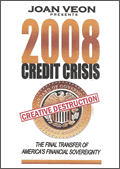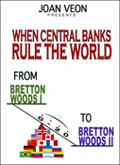THE GROUP OF TWENTY & THE EVOLUTION OF GLOBAL GOVERNANCE
By Joan Veon
September 28, 2009
NewsWithViews.com
In 1994 when I covered my first global meeting, there was a press briefing by the Commission on Global Governance on their forthcoming report, Our Global Neighborhood. The man giving the briefing was one of the co-chairs, Sir Shridath Ramphal who was not only president of Guyana but also president of the (British) Commonwealth Association. As I read the glossy brochure, I thought he meant “global government” to which he replied “No, no, no we mean global governance.” When I asked about a global currency, he laughed and said, “No, not for a long time.”
The meeting recently held n Pittsburgh comprised the third meeting of the heads of state and finance ministers from the Group of Twenty nations: the developed countries led by the United States, Canada, Great Britain, France, Italy, Japan, Russia and Germany and the top developing countries: Argentina, Australia, Brazil, China, India, Indonesia, Mexico, Saudi Arabia, South Africa, South Korea, and Turkey, as well as the European Union. Together, they represent 85% of the world’s Gross Domestic Product-GDP and 80% of world trade.
The Group of Eight-G8 began meeting in 1973 when Richard Nixon called together the leaders of four countries to determine how the world would be run economically now that he had put the world currencies on a floating basis when he removed the last ties the dollar had to gold in 1971. A formal meeting was held in 1975 in France with five countries and soon it was seven countries known as the Group of Seven until 1998 when Russia was officially admitted. Since 1975, whatever decision these seven or eight countries came to was law and if the rest of the countries of the world knew what was good for them, they would follow suit. In short, the Group of Eight acted as a “Global Board of Directors” for the world. Over the years, they expanded their purview to include every facet of government: labor, education, transportation, trade, housing, finance and the environment.
Under their auspices, the floating exchange between countries was perfected to the point where it was easy to raid any countries currency which did not do what they were suppose to do as mandated by the strong countries, there was the oil crises of the 1970s, and the fall of the shah of Iran who was the peacekeeper of the Middle East. The final pieces were added to the international infrastructure: the World Trade Organization, the regional groups like the European Union and the Free Trade Areas of the Americas, the International Criminal Court, and the tearing down of economic barriers between the countries of the world by calling on the U.S. to repeal the Glass-Steagall Act in 1999.
In 1998, the Group of Eight decided to become more integrated as they deviated from just economic concerns to the daily concerns that each country faces: health, education, growth, trade, etc. Tony Blair talked about the need to work together on all these issues so that each country could help each other and they could learn from one another. This is called integration, not advice. The final Communiqué which the G8 issued (then the G5) in 1975 was just a few pages to over one thousand pages in some years. Indeed they became a venue of “global governance.”
As a result of the 2007-2009 Credit Crisis, it was former President George Bush who called together the leaders of the developing countries to meet with the leaders of the developed countries last November. They instantaneously became their own powerhouse. At the second meeting in London this past April, they empowered the International Monetary Fund with $1.1T including a new offering of Special Drawing Rights-SDRs and they changed the Financial Stability Forum to the Financial Stability Board and greatly empowered its structure by giving them a plenary structure and several Steering Committees. The Financial Stability Board is part of the growing architectural pieces at the Bank for International Settlement in Basel, Switzerland.
In an interview with Professor John Kirton of the University of Toronto who heads up the unofficial secretariat of the Group of Eight and Twenty, he said of global governance, “It has come to mean, steering, shaping the global order through processes. Not only government of nation-states assisted by intergovernmental organizations, but a broad array of actors that have an important and legitimate place.” When I asked about how they and their roles had changed, he responded that the G20 had “institutionalized itself in an integrated way with the G8 so that next year in Canada, there would be a coming together of the two global governance institutions.” It was announced in Pittsburgh, that next year the G20 would meet at the same time that the G8 meets on economic issues. The G8 will continue their oversight of all other issues they currently govern. This is no small feat. Does anyone really understand the magnitude of what is happening?
When I asked Professor Kirton about the evolution of definitions of global governance since 1994 when we first met, he said, “Yes, there are many definitions for a global community [to be] attracted to a global concept. [You have the] command hierarchy in sovereign nation-states, [then there is] a middle range – a guiding steering process when more formal institutions are necessary but a broad array of actors from civil society have an important place.” In other words, the global level is to be guided by civil society which includes non-governmental organizations, “celebrity diplomacy” created by the rock star, Bono, and others.
In fact, Professor Kirton was adamant that the United Nations has seen its day since they have been unable to respond to a changing world. He pointed to the UN Security Council which has the same five permanent members in today’s world and that it does not even include Japan (G8 member) or China and any of the other developing countries.
The truth of the matter is that the coming together of the major developing countries with the G8 is a turning point in world history. If Bush is copying Nixon who created the G8, the truth of the matter is that we have continued to have serious economic crises. But it also points to a stronger power over the nation-states: the presidents and prime ministers who will ask their governments to implement what they have agreed to. It does point to a world governmental structure in which the laws of the nation-states have and are being changed to conform to what is agreed to on the global level. It leaves out the poor countries of the world which have no voice in this newly empowered governance structure.
It also points to a shift in world power. As you study the economics of the G20, they have a total GDP of $47T and public debt of $29T or 63%. Now we can talk all we want about global governance, interdependence, etc. but the truth of the matter is that there is more than one way to conquer a country. In the old days, it was a physical invasion, brute force, end of story. But in today’s electronic society, it is through banking, the stock exchange, the bond exchange, and the derivatives market. Basically, there has been no physical invasion, no black helicopters and no physical carnage. Today, it is debt. What difference does it make if the house has no or little equity versus the finances of a country? The Group of Twenty is indebted to the central bankers of the world. The agenda of the United Nations, the G8 or the G20 is basically a front for the real powers that run the world: the central banks which are private corporations that lend money to governments by printing it.
|
Subscribe to the NewsWithViews Daily News Alerts! |
The bottom line: the United Nations and the G8 have not brought or kept world peace, they have not prevented war and neither have they improved the finances of any country. Furthermore, they have not improved the state of the world either. The only thing they have done is set up an infrastructure that reduces the power and sovereignty of the nation-state. In essence they have de-stabilized the world. Who really runs the country and the world? He who has the gold makes the rules and it is not governments!
� 2009 Joan Veon - All Rights Reserved
Sign
Up For Free E-Mail Alerts
E-Mails are used strictly
for NWVs alerts, not for sale
 Order
Joan Veon's book;
Order
Joan Veon's book;
"The
United Nations'
Global Straitjacket"
Joan Veon is a businesswoman and international reporter, who has covered over 100 Global meetings around the world since 1994. Please visit her website: www.womensgroup.org. To get a copy of her WTO report, send $10.00 to The Women's International Media Group, Inc. P. O. Box 77, Middletown, MD 21769. For an information packet, please call 301-371-0541
E-Mail: t7w7g7@aol.com
Website: www.womensgroup.org















